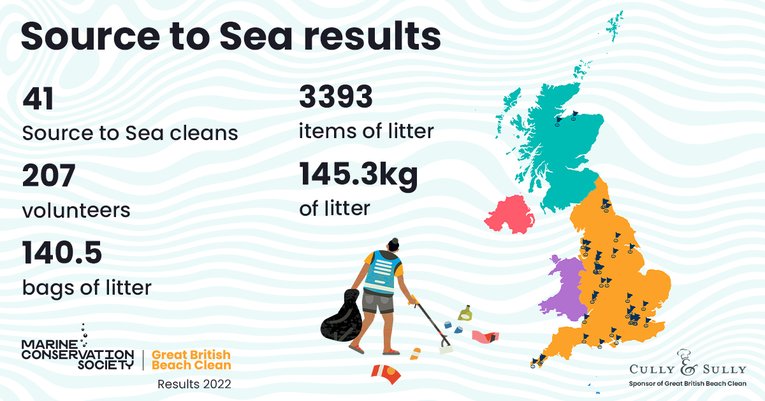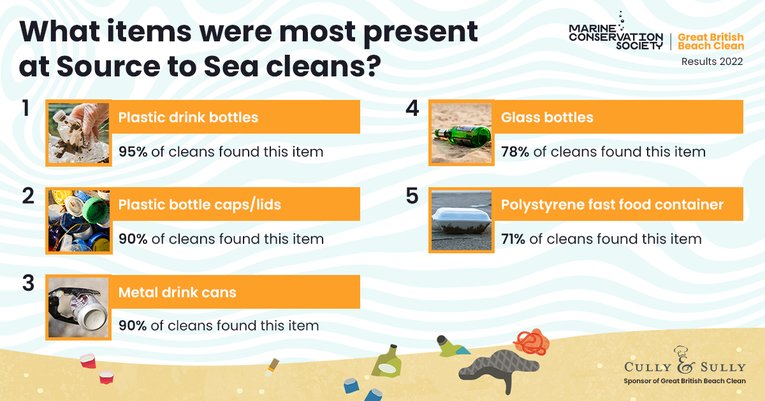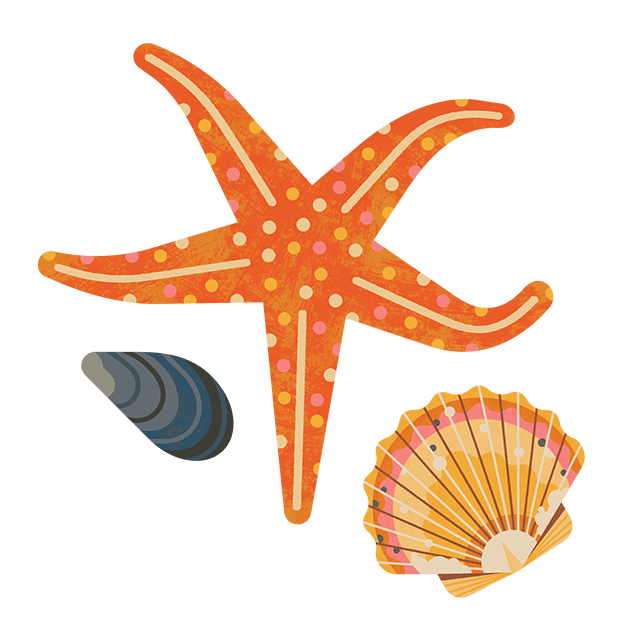
Source to Sea Litter Quest
No matter where you live across the UK, you can help keep our seas clean. Most of the litter that ends up on our beaches or in the sea starts its journey in villages, towns and cities miles from the coast.
What is Source to Sea Litter Quest?

Credit: Billy Barraclough
As part of our inland litter cleans, we use the data you collect to track rubbish back to its source. Your survey results are then used to find solutions to ocean pollution and to campaign for measures to bring positive change.
Taking part is simple and you can conduct a clean at any time of year. You can make a difference wherever you are in the UK.
How to take part
Before heading out to conduct your survey, check out our handy risk assessments to help you stay safe. If you are leading a group, we've put together a handy guide to help you run a litter pick.
There are 15 items to look out for when you head out on your litter quest. Taking part is simple:
- Download and print our Source to Sea Litter Quest form. We have also created a simplified recording form, with clear line drawings of each item, which are easy to print for larger groups.
2. Head to your local park, street or river and record which litter items you spot there - keep a tally of how many you find. If you are taking part with younger children, you can tick the form instead.
3. If it is safe to, and the litter is on public land, you can either take the rubbish home with you or arrange uplift of litter with the local council - remember to recycle it wherever possible
4. Submit your litter data using our handy form. If you prefer, you can email us a photo or scan of your form to [email protected]
This year's Litter Quest items
We've made some recent changes to the Source to sea litter quest form in response to feedback from our volunteers. You can find out more about the changes here.

Why your help matters
All of the data you collect on the beach, on your street or in a local park helps us campaign for change to protect our ocean.
Plastic bag charges
We’ve used data collected in previous years to make the case for carrier bag charges across the UK. Wales introduced charges in 2011 followed by Scotland in 2014 and England in 2015.
We know policies like carrier bag charges work. Since their introduction across the UK, we’ve seen a 61% drop (2011-2021) in the number of plastic bags we’re finding on beaches. The more data we collect, the more policies we can push for to make beach and ocean pollution a thing of the past.

Credit: Rich Carey via Shutterstock
Vapes
With 14 million single-use vapes sold each month in the UK, many are ending up littered on our streets where they pollute the environment, making their way into rivers and eventually, the ocean.
We know that disposable vapes are polluting our streets, parks, rivers and beaches. By taking part, you’re helping to gather data which acts as evidence to show just how much of a problem disposable vapes are for our environment. Find out more about our Ban disposable vapes campaign here.

Credit: Laura Young
Wet wipes
Sometimes it’s hard to understand a single wet wipe can make such a big impact hundreds of miles away. But each year we find evidence of the impact of a single flush on our beaches and in our coastal waters. In 2020, we found 18 wet wipes on every 100m of beach during our Great British Beach Clean and these are consistently found in the top 10 most common litter items on Scottish beaches.
Many wet wipes contain plastic fibres which break down into microplastics and become harmful to marine animals. We’re calling for UK governments to ban single use plastic wipes.
Balloons
Letting balloons go and setting off sky lanterns may seem like a bit of harmless fun, but what happens when they float out of your sight and disappear from your thoughts? They land somewhere – either intact or in bits with their trailing strings and plastic ties.
Over the past 5 years, we've found on average 3 balloons per 100m during our Great British Beach Clean!
Councils all around the UK got involved in our ‘Don’t let go’ campaign and voted to ban outdoor balloon and sky lanterns releases.
Source to Sea Litter Quest 2022 results
A huge THANK YOU to those who took part in an inland clean during Great British Beach Clean. 80% of litter found in our oceans finds its way there from inland sources, so tracking this litter is really important to identify where the litter may come from. Here's what you found this year.


You can carry out a Source to Sea litter quest at any time of year. All of the data you collect is valuable in our campaigns for cleaner seas.

This project is funded by the Government's Green Recovery Challenge Fund. The fund was developed by Defra and its Arm's-Length Bodies. It is being delivered by The National Lottery Heritage Fund in partnership with Natural England, the Environment Agency and Forestry Commission.


